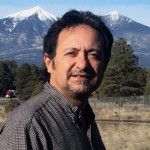(Hover over each photo to see a description)
Request to Speak system allows public to comment on, follow bill status from home
By Frank X. Moraga / AmigosNAZ
Ah yes, those rascals down in the state legislature in Phoenix have come up with another proposal — a plan to make the school year start after Labor Day statewide.
The bill (HB2303), proposed by Rep. Eddie Farnsworth, R-Gilbert, is designed to cut air conditioning costs for schools during the waning days of summer, benefiting the hottest regions of the state, e.g. metropolitan Phoenix.
Understandable for an area that was enjoying a toasty 105 degrees on Aug. 8, 2014. But what about us folks up here in Flagstaff where we were having problems breaking into a mild sweat with the high of 80 degrees that same day?
Besides a mild disruption of vacation and daycare plans, opponents say the move would reduce the amount of instructional days prior to the AIMS (Arizona’s Instrument to Measure Standards) tests that are administered in the spring.
“There really was a focus about how many days do we want to get in before that assessment takes place so that we maximize the educational time for kids to learn,” Janice Palmer, a lobbyist for the Arizona School Boards Association, was quoted by Capital Media Services.
Meanwhile, local legislators want a bit more geographical flexibility for their school districts.
“In Flagstaff, when the monsoons come in, the temperatures drop,” Rep. Bob Thorpe, R-Flagstaff, stated in the same story. “Weeks before we might be in 85-90 degrees and then all of a sudden we’ll see a drop down to 75 degrees.”
Have an opinion, but don’t want to make the trek to an already warming Phoenix?
Or want to comment on even more controversial issues like the proposed 5 percent cut to the state’s education budget?
Arizona superintendents said the proposed cut would cause a loss of $113 million in spending to such areas as technology, textbooks, library, food service and health workers, according to a story this week in the Arizona Republic.
Thanks to the wonders of technology, the public’s voice can be heard at every step of the process from initial Senate or House committee hearings to the final reading and vote in both bodies of the legislature.
Geoff Esposito, government-relations analyst for the Arizona School Boards Association (ASBA), was in Flagstaff recently presenting a session on the legislature’s Request to Speak system. The event, presented by the Coconino Coalition for Children & Youth, was attended by more than two dozen local residents.
The system allows the public to log in and comment at every step of the process, he said.
“It allows you to show your position or neutrality (on the issue),” he said. “It gives you a chance to testify and have your comments entered into the public record.… The legislators will see that their constituents have left comments on the bill and it gives them cover to vote one way or the other.”
The comments are then attached to and follow the bill; the system also allows the public to monitor the progress of the legislation.
One person in the audience asked if their one comment would really make a difference.
“They like to hear from real people … They want to hear from average folks and that tends to carry a lot of weight, especially if folks are willing to drive down” to Phoenix to speak at the committee hearings,” Esposito said. “It’s more impactful than the lobbyists. We’ve asked them how many people they hear from and they say between three and eight (per issue) on a regular basis.”
One local legislator was asked how many calls it takes to help them make their decision and they responded about 18 calls, fewer than the number of people attending the training session.
“If you want to make an impact, just leave a comment.… Do they read the comments? Yes. They know when a bill is coming up for a vote” and will use the comments from their constituents to help them make their decision, Esposito said.
It’s important to understand the legislative calendar in order to make the most impact, Esposito said. With bills being introduced in January, it’s important to get engaged that month and learn about the issues. Public comments are also most effective in February and March as the proposed legislation makes its way through the committees.
Also, be aware of the way a particular legislator likes to deal with the public.
“Each legislator is different and prefers a different form of (interaction),” he said. “The younger ones like emails. But there are legislators who can’t stand emails but love phone calls, or some who like old-fashioned letters.”
To use the Request to Speak system, the public can drive to Phoenix and register for a user name and password at any one of the kiosks positioned outside the committee rooms on the first floor of the Arizona Senate at 1700 W. Washington St. Sorry, the public cannot register online in the comfort of their homes.
Or, they can CLICK HERE for a Request to Speak sign up form, fill it out, scan and email it to gesposito@azsba.org or mail it to Arizona School Boards Association, 2100 N. Central Ave., Suite 200, Phoenix AZ 85004. The association will then input the information and send the requester a user name and log in.
Also, CLICK HERE to learn more about and share information on the Request to Speak system.
The public can then go to https://apps.azleg.gov to log in and track the status of their favorite bill.
This system saves everyone a two-hour drive to Phoenix where the high this week was already 80 degrees. Isn’t this February?
— Frank X. Moraga, editor/publisher of AmigosNAZ, has served as business editor, director of diversity, city beat and environmental reporter in the newspaper industry. To submit information to AmigosNAZ, send an email to fmoraga@amigosnaz.com






